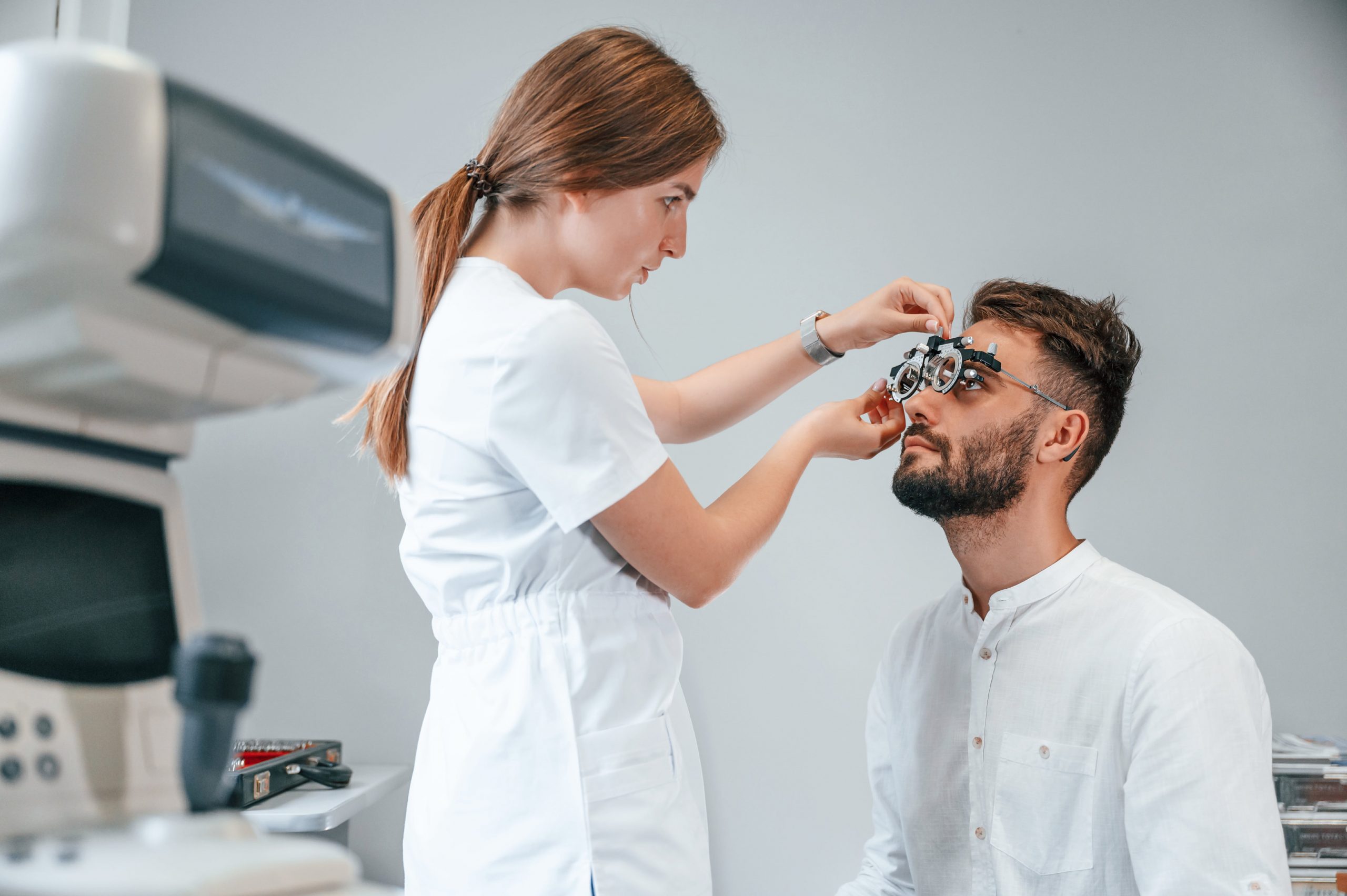Erectile dysfunction, or ED, is a common condition that affects at least 12 million men in the United States. It can be caused by a variety of vascular, neurologic, psychological, and hormonal factors.
Many of these conditions can be treated by making healthy lifestyle changes. Medications can also be used to treat the problem.
Symptoms
Most men have difficulty achieving or maintaining an erection from time to time. Usually, this is normal and doesn’t require treatment. It’s only when a man experiences this consistently that it can become a problem.
One of the first signs of ED is that it takes more time to get an erection than usual. Another symptom is that it doesn’t last as long as a man would like and can be purchased at apoteketrecept.com
Your ability to become aroused is a complex process that involves your brain, hormones, nerves, blood vessels, and muscles. Any one of these parts can fail to work properly, which can cause erectile dysfunction (ED).
The main symptom of ED is a lack of sexual desire. This can be embarrassing and affect your social life.
You may also experience low libido, which means you don’t feel that much sexual excitement. These symptoms can be a sign of a more serious health problem, such as diabetes or heart disease.
ED can also affect your mood and reduce your confidence. It can make you feel stressed and anxious about having sex, making it difficult to relax and enjoy your partner.
If you are experiencing any of these symptoms, talk with your doctor about it. Your doctor can run tests to determine the cause of your ED and help you find treatments that will work for you.
A physical exam and blood and pee tests can check for conditions that could be causing your ED, such as diabetes, heart disease or low testosterone levels. Your doctor might also do a mental health exam to see if you have any stress or depression that may be contributing to your ED.
Your doctor will also ask you about any medications or drugs that you are taking. These can include stimulants, sedatives, antihistamines, diuretics and drugs to treat high blood pressure or cancer.
Some medications can interfere with the signal from your nerves that make an erection happen. These include certain medications to control high blood pressure, antidepressants, atypical antipsychotics and some drugs used to treat prostate cancer or other diseases.
Testing
Erectile dysfunction (ED) is a common problem that may be caused by multiple factors. There are many simple tests that can help your healthcare provider diagnose ED and get you on a healthy path to feeling better.
The first step is to talk with your doctor about your sexual history and your sex drive. This will give them a better understanding of what is causing you to have erection problems and how you go about getting and maintaining an erection. It also allows them to ask questions to learn more about your overall health and your relationship with a sexual partner.
Your doctor can then order a variety of laboratory tests that might reveal the cause of your ED. These include blood counts, urinalysis, lipid profile, and measurements of liver and kidney function.
If these tests find something serious, they might refer you to a urologist for further evaluation. Your healthcare professional will discuss a number of treatments and options with you, including oral medications or injectable medications, depending on the cause of your ED.
In some cases, a physical cause can be detected with a test called penile doppler ultrasound. A trained technician or urologist uses a small instrument to send sound waves into the penis and take pictures of the blood vessels that supply the penis. These pictures show whether there is diminished blood flow or venous leakage, both of which could contribute to your erection problems.
Some medical conditions are linked to ED, such as heart disease and diabetes. If you have these diseases, ED can be a warning sign that the disease is progressing or will worsen in the future.
There are other causes for ED, such as aging, hormonal changes and certain medications or treatments for prostate cancer. For example, if you’re treated with radiation or surgery for prostate cancer, it can damage your penile tissue and nerves.
Hormonal changes that occur with age can decrease sensitivity to touch and affect your libido. These changes can make it more difficult to achieve and maintain a healthy erection, leading to ED.
Treatment
Erectile dysfunction (ED) is a problem in which you have trouble getting or keeping a firm, long-lasting erection. It can be a frustrating, annoying, and sometimes embarrassing experience. The good news is that ED is usually caused by an underlying health issue, such as heart disease or diabetes, and can often be treated to improve your sexual health and quality of life.
Typically, your doctor can diagnose ED by conducting a physical exam and asking questions about your medical history. He may also order tests to help determine the cause of your ED. These include blood tests, urine tests, and ultrasound of your penis to check for artery damage.
A medical specialist can treat ED with medication, such as prescription drugs or injections. These medications increase blood flow to the penis. Other options include a vacuum device or a special drug called a PDE type-5 inhibitor.
If these medications don’t work, your doctor might recommend a different treatment option. Penile implants, which are semi-rigid rods that are placed into both sides of the penis to help control erections, are an effective treatment for some men.
Other non-surgical treatments for ED include education about sex, exercise and therapy. These strategies can help reduce stress and anxiety that contribute to ED. In addition, couples counseling can help a man and his partner understand and cope with the problems.
Another treatment option is hormone replacement in the form of topical gels, creams, patches, or injections. This method is usually used to treat a man with low hormone levels.
In most cases, a person with ED can get better by working with their primary care physician or urologist to address the underlying medical condition. This can include changes in diet, regular exercise, and managing diabetes, high cholesterol, or other chronic health conditions.
The underlying health condition can also be addressed by managing other risk factors, such as smoking or alcohol consumption. Medications, such as antidepressants and other mental health medications, can also be helpful.
The best ED treatment plan depends on the underlying cause of your ED and your personal preferences and needs. The doctor will work with you to choose the right ED treatment to meet your unique needs and improve your sex health and well-being.
Prevention
Erectile dysfunction is a common problem that affects many men. It can be a result of hormonal, neurological, or vascular disorders. It also can be a side effect of treatment for prostate cancer or other health conditions.
There are several ways that you can prevent ED. The first is to see a doctor who can identify the cause and recommend treatment. Your doctor may also order certain tests to see if there are any problems with blood flow to your penis or nerves. If these tests are negative, you can try lifestyle changes to increase blood flow and improve your erections.
A healthy diet and regular exercise are important for the heart, brain, and those arteries that lead to your penis. They help reduce the risk of high cholesterol, diabetes, and blood pressure but can damage those arteries and lead to ED.
Other healthy lifestyle choices include quitting smoking, limiting alcohol, and maintaining healthy body weight. You should aim for at least 30 minutes of physical activity most days of the week.
If you are overweight or have high blood pressure, talk with your doctor about how to manage your weight and reduce your risk for ED. Changing your eating habits to eat less red meat, more fish, fruits, vegetables, and whole grains is also helpful.
You can take prescription medications to increase blood flow to your penis or to stimulate the production of a hormone called testosterone. These drugs can be used in conjunction with other treatments to control ED.
Hormone replacement therapies (HRT) can help restore your natural sex hormone levels and improve arousal. They are safe and effective and can be a lifelong treatment for most people with ED.
Herbal supplements can also be beneficial in preventing ED. These supplements can contain herbal extracts that have been shown to promote erections and healthy sexual function. Some of these herbs include saw palmetto, horny goat weed, ginseng, Tribulus Terrestris, and more.
It’s best to use a supplement that contains a combination of multiple herbs. The most effective supplements will also have added antioxidants and vitamins.











